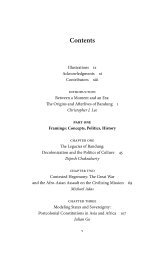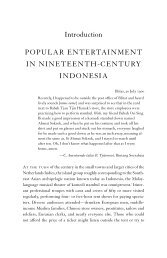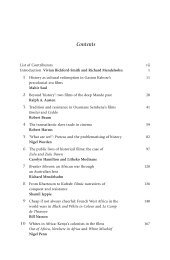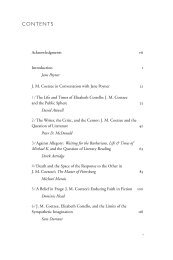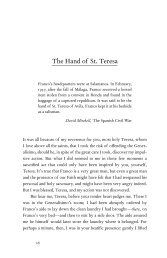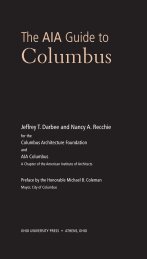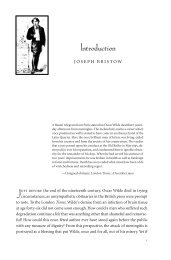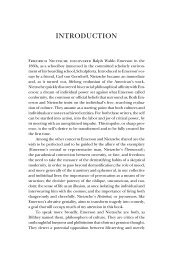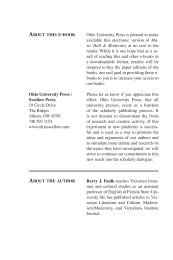Race, Revolution, and the Struggle for Human Rights in Zanzibar ...
Race, Revolution, and the Struggle for Human Rights in Zanzibar ...
Race, Revolution, and the Struggle for Human Rights in Zanzibar ...
You also want an ePaper? Increase the reach of your titles
YUMPU automatically turns print PDFs into web optimized ePapers that Google loves.
<strong>the</strong> establishment of multistoried apartment complexes, factories, <strong>and</strong><br />
youth labor camps, paid <strong>for</strong> through <strong>the</strong> imposition of socialist austerity<br />
measures, such as <strong>for</strong>ced labor <strong>and</strong> food rations. Socialist nations cont<strong>in</strong>ued<br />
<strong>for</strong> two decades as sources of <strong>for</strong>eign aid <strong>and</strong> as patient tutors <strong>in</strong><br />
<strong>the</strong> techniques of authoritarian rule. Socialist vocabulary expressed old<br />
ideas <strong>in</strong> new words; new terms gave old antagonisms—<strong>and</strong> <strong>the</strong> revolution<br />
itself—a new legitimacy by <strong>in</strong>clud<strong>in</strong>g <strong>the</strong>m <strong>in</strong> a global conflict aga<strong>in</strong>st<br />
imperialism <strong>and</strong> <strong>in</strong>justice.<br />
For most <strong>Zanzibar</strong>is, regardless of ethnicity, <strong>the</strong> <strong>in</strong>itial violence <strong>in</strong> 1964<br />
affected <strong>the</strong>m less than <strong>the</strong> series of policies that followed. They experienced<br />
<strong>the</strong> revolution less as a sudden outbreak of violence than as more<br />
than a decade of confiscations, shortages, surveillance, <strong>and</strong> fear. Ali Mazrui<br />
observed <strong>in</strong> 1972 that <strong>the</strong> revolution caused “a devastation of <strong>the</strong> polity,<br />
a dislocation of <strong>the</strong> economy of <strong>the</strong> country, a general sense of <strong>in</strong>security<br />
<strong>in</strong> <strong>the</strong> population, a lack of sense of direction <strong>in</strong> national policies, <strong>and</strong> a<br />
rapid erosion of human values.” 55 The revolution swept away much of <strong>the</strong><br />
substance of <strong>the</strong> legal, bureaucratic order of <strong>the</strong> colonial state <strong>and</strong> <strong>in</strong>verted<br />
a social pyramid present <strong>in</strong> <strong>the</strong> isl<strong>and</strong>s s<strong>in</strong>ce <strong>the</strong> Omani colonization.<br />
Karume’s regime was dedicated to redistribution <strong>and</strong> <strong>the</strong> idea of “<strong>the</strong><br />
first shall be last, <strong>and</strong> <strong>the</strong> last shall be first.” Most m<strong>in</strong>orities left who<br />
could possibly af<strong>for</strong>d to do so <strong>and</strong> who had survived <strong>the</strong> <strong>in</strong>itial bloodlett<strong>in</strong>g.<br />
As, <strong>in</strong> Nyerere’s eyes, <strong>the</strong> “new sultan” 56 of <strong>Zanzibar</strong>, Karume sat<br />
atop an extensive, East German–tra<strong>in</strong>ed security apparatus <strong>and</strong> was able<br />
to rule by personal decree.<br />
For supporters of <strong>the</strong> revolution, however, <strong>the</strong>se were years, despite<br />
<strong>the</strong> hardships, when <strong>the</strong> regime extended access to Africans <strong>in</strong> education,<br />
health care, l<strong>and</strong>, <strong>and</strong> hous<strong>in</strong>g. For nearly all <strong>Zanzibar</strong>is, <strong>and</strong> <strong>for</strong><br />
better or worse, <strong>the</strong>se were years of discipl<strong>in</strong>e; <strong>in</strong> contrast to <strong>the</strong> rout<strong>in</strong>e<br />
corruption of more recent times, civil servants were afraid to steal. In an<br />
era of “Cultural <strong>Revolution</strong>,” <strong>the</strong> ubiquitous security apparatus rout<strong>in</strong>ely<br />
punished displays of “decadence” or “idleness,” such as wear<strong>in</strong>g m<strong>in</strong>iskirts<br />
or bell-bottom pants or avoid<strong>in</strong>g political meet<strong>in</strong>gs or <strong>for</strong>ced-labor assignments.<br />
Cultural <strong>for</strong>ms like ngoma dances were designated as <strong>in</strong>digenous<br />
<strong>and</strong> promoted, while o<strong>the</strong>rs such as taarab, Western music, <strong>and</strong> c<strong>in</strong>ema<br />
were repressed. Tens of thous<strong>and</strong>s of <strong>Zanzibar</strong>is went to labor camps<br />
<strong>and</strong> learned to march, drill, <strong>and</strong> h<strong>and</strong>le guns like good soldiers. While<br />
<strong>Zanzibar</strong>is experienced social <strong>and</strong> commercial isolation, <strong>the</strong> isl<strong>and</strong>s <strong>for</strong> a<br />
brief moment captured <strong>the</strong> imag<strong>in</strong>ation of a generation of Cold War<br />
warriors. While largely cut off from its connections with<strong>in</strong> <strong>the</strong> Indian<br />
Ocean world, <strong>the</strong> archipelago achieved <strong>in</strong>ternational recognition as a l<strong>in</strong>k<br />
<strong>in</strong> a global cha<strong>in</strong> of socialist revolutions <strong>and</strong> received a series of esteemed<br />
Cosmopolitanism <strong>and</strong> Its Discontents 23



